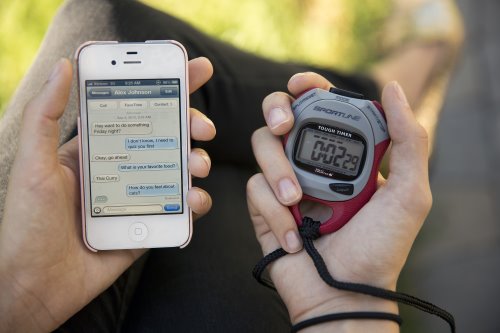Ever have a conversation with someone and notice that the person’s eyes are staring off into space or the tone of their voice changes suddenly when asked a question. These may be tell-tale signs that they’re telling a lie, but how can you detect if you’re being lied to through text messages (or social media and instant messaging for that matter) if you can’t see a face or hear a voice?

Do you lie while you're texting? (Image via Brigham Young University)
Brigham Young University (BYU) in Utah has released a study that reveals that when people are telling lies in these kinds of digital messaging forums, they usually take longer to respond since they are making more edits and write even shorter responses than usual.
“Digital conversations are a fertile ground for deception because people can easily conceal their identity and their messages often appear credible,” says Tom Meservy, BYU professor of information systems.
According to Meservy, humans aren’t that skilled at detecting lies to begin with, with only a 54% accuracy rate.
He predicts that this kind of digital lying can have an impact on our finances, security, and personal safety so he joined up with BYU professor Jeffrey Jenkins, and others from the University of Nebraska and the University of Arizona to create an experimental instrument that can track possible cues of online lying.
How they did it
First the team created a computer program that could have online conversations with participants of the study (along the lines of customer service surveys for consumers).
Over 100 students from two universities in different areas of the United States and asked them to have conversations with the computer in which they were asked a series of 30 questions. The participants were instructed to lie in half of their responses. What the researchers found was that the times a lie was being told, the participant took 10% longer to respond.
“We are starting to identify signs given off by individuals that aren’t easily tracked by humans. The potential is that chat-based systems could be created to track deception in real-time,” said Meservy.
The BYU team agrees that is just the beginning of the research and we shouldn’t go out an immediately assume everyone is lying to us because they take longer than usual to respond to a digital message.
In the meantime, they will continue their efforts by using other sensors like Microsoft’s Kinect to track human behavior and see how it ties in to deception.
Story via Brigham Young University.
Advertisement
Learn more about Electronic Products Magazine





